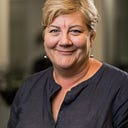It’s National Child Protection Week.
On Wednesday I was part of a NAPCAN panel discussion talking about the importance of valuing and respecting children and young people’s voices in preventing child abuse.
The Child Protection theme this year is ‘play your part’ with a focus on listening to children and young people. I spoke to the audience in Elder Hall about the importance of respecting and valuing our children and highlighted the fact that there needed to be a change in how we view children and young people in order to make any real changes in the prevention of child abuse.
It shouldn’t be a new or difficult concept to understand that the way we protect children from harm is to listen to what they have to say and listen to their non-verbal communication. But the shift from understanding to action seems to elude us. Our adult centric culture is a hard one to shift and requires a mindset shift and a behaviour shift in order to respect and value the input of children and young people in everything we do.
In my conversations with children and young people, the key thing they ask of adults is to be respected. In order to really listen to children and young people we need to respect and value them. If we have a society where we see children as equal, then we don’t talk down to them or ask them to sit on the floor while we stand or sit on a chair. We don’t yell at them to get them to stop yelling. We don’t shame or ridicule a young person to get them to stop doing something we don’t like. If we want to truly, genuinely listen to children and young people, then their opinions hold high value in everything we do and the ‘listening’ isn’t just an afterthought or a box ticking exercise. Genuinely listening to the voices of children and young people is at the heart of keeping them safe in society.
A key part of my role is to promote the participation of children and young people and to advocate for their rights and interests. This comes from the UN Convention on the Rights of the Child (Article 12) which says that ‘children and young people have a right to have a say on all issues that affect them and for their views to be taken seriously.’ As part of fulfilling my obligation to promote, advise and support the government to meet their obligations to be in line with Article 12 of the UNCRC I have been looking at South Australia’s key Government Departments to see how they are doing in this regard. I wanted to assess the extent to which participation of children and young people is stated in their core public facing commitments.
I am writing to those departments to tell them how I think they are doing, and giving some ideas as to how they can better include children and young people.
Participation with children and young people can involve a range of activities from providing information to them, listening to their views, enlisting their help and involving them in decision making, monitoring and evaluation.
Working with children and young people and families gives policy makers and service providers the information they need to improve the relevance of their policies and services. This is equally true for dedicated services for children and young people and mainstream services. All government departments should engage with children and young people, not just the Department for Education or Department for Child Protection. Engaging children and young people in purposeful conversations is beneficial to all parties.
In the last couple of weeks I have had a range of conversations with inner city school students, International students, young leaders, and homeless young people on how they use the city, how they experience the city, and how the city could be more youthful. We talked about public lighting, public toilets, phone charging stations, afterhours all ages eating venues, skate park locations, public art, the central market and the need for outdoor all-weather gathering places.
I also had insightful conversations on customer service in government services and how it differs from business and how young people view and develop trust in government.
My office wants to support government to listen to children and young people and is reaching out to say we are available to collaborate and support them to identify how to engage young people, facilitate their participation in their business and plan and run effective and engaging sessions with them.
Meaningful participation supports children and young people to feel valued, respect their environments, demonstrate citizenship and build sustainable community engagement. If we truly engage, respect and value children and young people, we can make a difference in outcomes to their futures and help those most at risk of abuse. I am talking about profound changes from a shift in how we are culturally as a society in our attitude towards children and young people.
Its not just government departments, it’s all of us. We can all do this by listening to children, respecting them and valuing who they are as people.
Helen Connolly, Commissioner for Children and Young People SA.
Friday 7th September 2018
